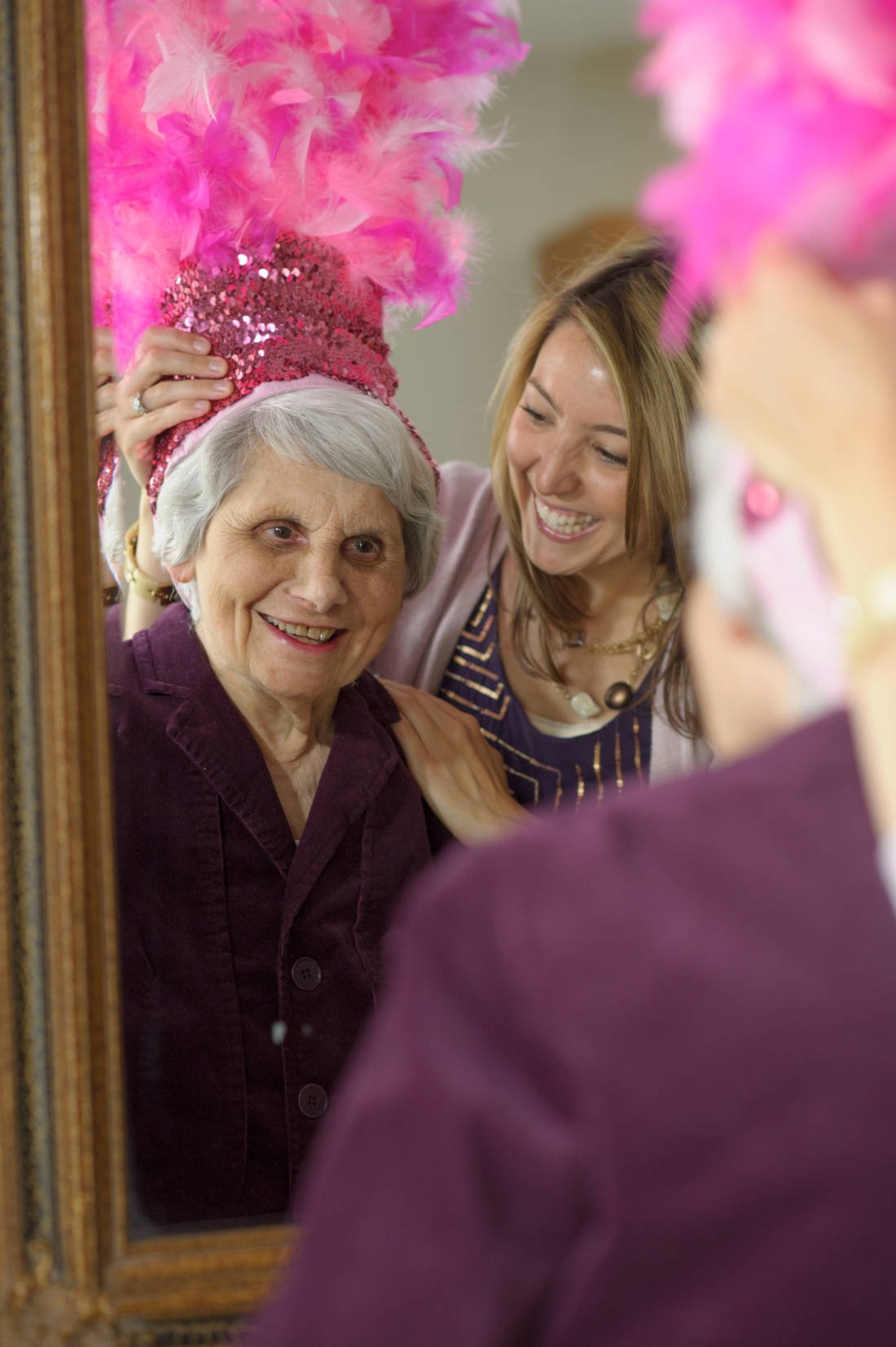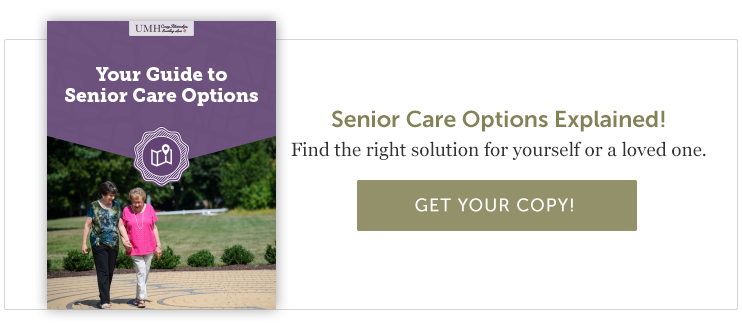Managing the Stress of Social Distancing Amid COVID-19
Independent Senior Living | senior living homes | Aging & Caregiving | dependent senior living
As each calendar day ticks by, we’re reminded again and again how deeply the coronavirus has impacted every single one of us. For months, we’ve scrambled to discover new ways of coping, new ways of living and working, new ways of defining “normal” in so many aspects of our lives.
Unsurprisingly, these challenges have triggered a range of emotions, from fear and anxiety to sadness, loneliness and stress. If you (or a senior in your life) are struggling with these types of feelings, it’s important to prioritize your mental health and take advantage of opportunities to enhance your personal well-being.
Given the many daily disruptions COVID-19 has generated all along its path, it’s completely understandable to feel overwhelmed by it all—particularly when it comes to critical safety precautions like social distancing. To help you gain valuable perspective and manage the stress you may be experiencing, we’re providing expert insights on the matter. Take a minute to take in these tips for a more manageable way to move forward.
What is social distancing, and why does it matter?
First things first: It’s essential to understand why we’re doing all of this in the first place. Otherwise, it begins to feel like an unnecessary burden. The truth is that social distancing, however difficult it may seem, is fundamental to stopping or slowing the spread of the coronavirus.
Also known as physical distancing, or minimizing physical interaction among and between people, social distancing has been emphatically encouraged by the world’s scientific and medical community to slow the transmission of the virus and mitigate the risk of contracting COVID-19.
Regardless of your age or stage in life, you play a vital role in this mission. By limiting social interaction and ensuring six feet of space between yourself and others whenever possible, you help protect the people who are at high risk of experiencing severe illness from COVID-19, especially if one of those people is you or someone you love.
It’s been discovered by the medical community that older adults, particularly those over the age of 85, are some of the most at-risk individuals in terms of having significant, even life-threatening COVID symptoms. The risk is also very high for those people with serious underlying medical conditions. There have been tens of thousands of people across the country who’ve suffered hospitalization, intensive care, reliance on ventilators and, in the worst cases, death.
It’s helpful to remember these realities when faced with the stress and loneliness of social distancing efforts. By prioritizing the health and safety of those around you, you become an integral part of the fight against this dangerous pandemic.
What impacts might social distancing have on your mental and emotional health?
Even though the reasons for practicing social distancing now and into the future are both meaningful and important, there’s no doubt that following these recommendations can have harsh repercussions on your mental health and emotional well-being. Social distancing can and unquestionably has caused people of all ages to experience:
- Loneliness in the absence of human connection
- Worry over their own and others’ health
- Concern for their financial situation
- Stress over the loss of support services they rely on
- Shifts in sleeping and/or or eating routines
- Difficulty focusing or concentrating
- Worsening of chronic health problems and existing mental health conditions
- Increased reliance on substances like drugs, tobacco and alcohol
Your ability to cope with these types of issues may hinge largely on the level of support you receive from family, friends and your community. Even so, no one is immune from the reality of pandemic-related stress and isolation. It can affect anyone, at any age, anywhere and in any way.
According to the CDC, people who may respond more strongly to the stress of this crisis include:
- People who are at higher risk for severe illness from COVID-19, including older adults and those with certain underlying medical conditions
- Children and teens
- People caring for family members or loved ones
- Frontline workers such as health care providers and first responders
- Essential workers who work in the food industry
- People who have existing mental health conditions
- People who use substances or have a substance use disorder
- People who have lost their jobs, had their work hours reduced, or had other major changes to their employment
- People who have disabilities or developmental delay
- People who are socially isolated from others, including people who live alone, and people in rural or frontier areas
- People in some racial and ethnic minority groups
- People who do not have access to information in their primary language
- People experiencing homelessness
- People who live in congregate (group) settings
What techniques are recommended to manage the stress of COVID-19?
However burdensome they may feel, social distancing efforts are necessary to reduce the spread of COVID-19. But that doesn’t mean there’s nothing you can do to effectively manage the resulting stress and help others do the same.
Below are some of the ways the CDC suggests to cope with social distancing and the stress COVID-19 may cause:
- Take breaks from watching, reading or listening to news stories, including social media, as hearing about the pandemic continuously can be upsetting.
- Take care of your body and mind. Take deep breaths, meditate, stretch and exercise regularly to help you relax and think clearly.
- Try to eat healthy, well-balanced meals.
- Get plenty of sleep.
- Avoid excessive or habitual use of alcohol and drugs.
- Connect with others online or on the phone, and talk with people you trust about your concerns and feelings.
- Make time to kick back and do activities you enjoy (that can be done while social distancing).
- Know what to do if you are sick and concerned about COVID-19. Contact a health professional before you start any self-treatment.
- Know where and how to get support services and resources, including counseling or therapy (either through in-person or telehealth services).
- Connect with your community- or faith-based organizations. While social distancing measures are in place, consider connecting online, through social media or by phone or mail.
- Know the facts about COVID-19 to help reduce stress and stop the spread of rumors. Understanding the risk to yourself and people you care about can help you connect with others and make an outbreak less stressful.
For additional tips on senior health and lifestyle issues, check out our blog. If you’re interested in learning more about United Methodist Homes senior living community, contact us today.
About Marissa Salvesen
My journey into the world of senior living began when I started working for United Methodist Homes in 2010. Starting as an Activities Director at one of our award-winning assisted and independent living communities and then transitioning to Marketing and Promotions Manager for UMH, I now work as the Manager of Mission Development, fostering the Mission and Values of our organization. I love sharing stories about the many ways we build meaningful relationships and enrich the lives of those we serve, and am proud to be part of building UMH’s 140-year legacy of caring. Wondering what makes our communities such special places to live and work? Connect with me and find out!

Our Blog is a 2016 Platinum Generations Award Winner! The Generations Award is an annual international competition for excellence in senior marketing recognizing professionals who have communicated to the 50+ Mature Markets.




